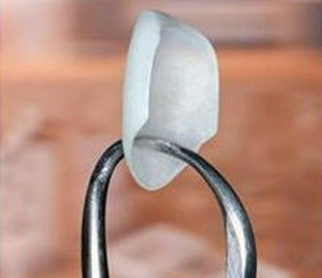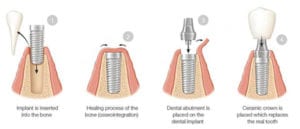Some people who experience sensitivity in their teeth wonder if the sensitivity will increase after a dentist shaves down their teeth in preparation for porcelain veneers.
Porcelain Veneers and Tooth Shaving – The Real Concern

A porcelain veneer only covers the front of a tooth
If a dentist has mentioned shaving down your teeth for porcelain veneers—run. Your teeth don’t need to be shaved down to receive porcelain veneers. A veneer only covers the front of a tooth. However, if you are receiving porcelain crowns, your teeth will need to be tapered because a crown completely covers a tooth.
Preparing Teeth for Porcelain Veneers
Most advanced cosmetic dentists will preserve as much tooth structure as possible when you receive porcelain veneers. Your dentist will determine if preparation is needed depending on several factors, including:
- the type of veneers you are receiving
- the position of your teeth
- your smile goals
- your dentist’s technique
No-prep veneers
If you’re receiving ultra-thin porcelain veneers, your cosmetic dentist might determine that your case does not require preparation of your natural teeth. One example is that if you want your teeth to look larger, thicker, or more pronounced, preparation might not be required.
Minimal-prep veneers
Skilled cosmetic dentists conservatively prepare teeth for porcelain veneers while leaving at least 90% of tooth enamel intact. There are several advantages to ultra-conservative preparation.
- Comfort – It only removes a small fraction of tooth enamel, which is non-sensitive tooth structure.
- Bonding – It does not affect the dentin—the layer beneath the enamel. When tooth preparation reaches the dentin, it’s tricky to get the porcelain veneer to stay bonded. And sensitivity can result.
- Health and appearance – Bonding to enamel instead of dentin provides a seal that keeps bacteria out and prevents microleakage. When bacteria can leak in and affect the dentin, it will cause the veneers to look dark, and infection can occur.
Look for an advanced—preferably accredited—cosmetic dentist to place your veneers. Your dentist will ensure that if preparation is needed, it will be minimal.
Will You Experience Sensitivity?
If your teeth are healthy and you receive no-prep or conservatively prepared veneers, you probably won’t feel any sensitivity after your veneers are placed. Patients who receive more aggressive preparation might temporarily experience mild sensitivity to heat or cold that lasts a few days up to a few weeks.
The dentist you select impacts the extent of preparation of your teeth, sensitivity issues, as well as aesthetics. We recommend that you find a dentist with advanced training in aesthetic dentistry. Look for a nearby accredited cosmetic dentist.
Accredited cosmetic dentist Michael Szarek, DMD of Lowell, MA sponsors this post.

